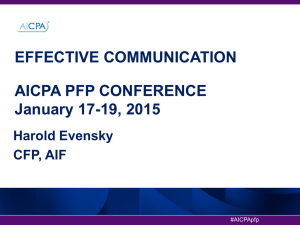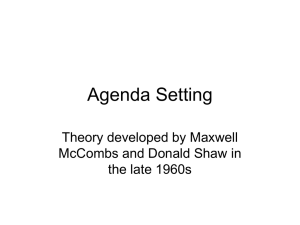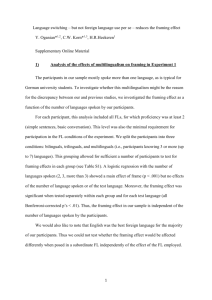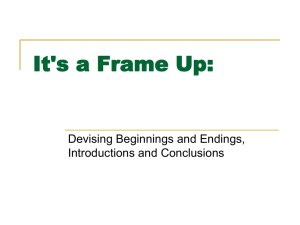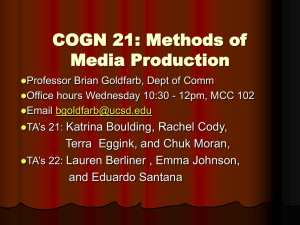Framing Questions
advertisement
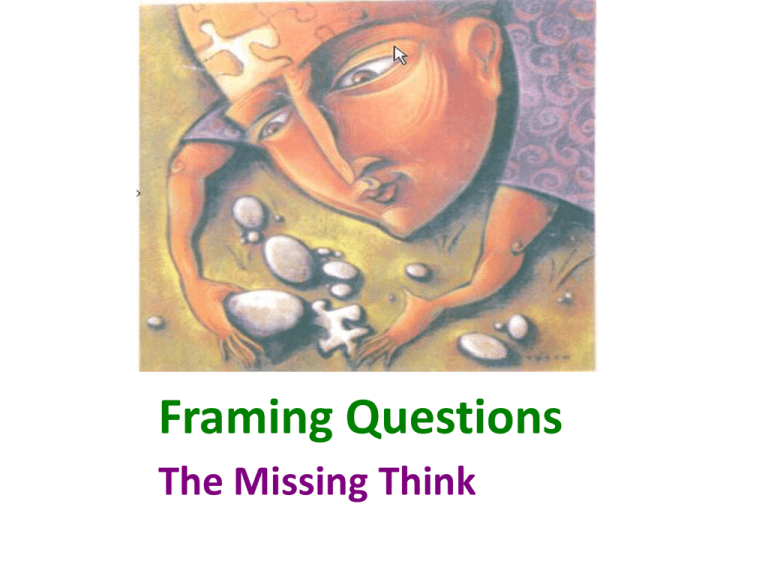
Framing Questions The Missing Think Rationale … Most teachers do not frame questions effectively How can such a simple process be so delightfully complex?? INSTRUCTIONAL INTELLIGENCE FRAMING QUESTIONS ASSESSMENT FOR LEARNING INSTRUCTIONAL INTEGRATION Instructional Intelligence … integrates six components • Provincial Curriculum • Assessment • Instruction • Guided by how kids learn • Change • Systemic Change The instructional component can be classified… • Concepts: accountability, safety, meaning • Skills: framing questions, wait time • Tactics: Place Mat, Numbered Heads, Round Robin, Fish Bone, One Stray Rest Stay • Strategies: Concept Formation, Johnsons’ 5 Basic Elements • Organizers: Multiple Intelligence, Brain Research, Gender (Women’s Ways of Knowing) Everything a teacher does can be classified into four areas … • Information provided • Activities assigned or selected • Questions asked • Responses to students efforts Madeline Hunter Framing Questions Instructional Intelligence What does history have to say about framing questions? John Millar, 1897 • Generally the best way of asking a question is to address the whole class. Each pupil should understand that be may be expected to reply. In stating the question no sign should be shown that would indicate who is to answer. The main thing is to secure that every student is held on the alert. Each question should be given to that student, who, with due regards to the interests of the class stands in most need of receiving it. This method has the great advantage of the teacher to apply a proper distribution of tests. P. 232 in the book: School Management and the Principles of Practice and Teaching. Framing Questions The Difference between Asking a Question and Framing a Question How do we increase the chances students pay attention? Framing Questions/Requests • Share with you partner please. What are endorphins? Be prepared to share your thinking. • Who can tell me who is the better friend -- the tree or the boy? • No hands please, I’ll pick several of you to respond. What are two explanations as to why boomerangs return? (After a 10 second wait time, Marco was selected to respond. Framing Questions/Requests…continued • Yesterday we talked about the use of wait time in asking questions. Could person B in each group please share why we use it. • Take 5 seconds and think of the difference between an instructional skill and an instructional strategy. One of you will be asked to share with your group. • Hands up please … does anyone know how to solve this equation? Framing Questions/Requests…continued • No call outs please. After the question I will give you 20 seconds; then I will count to three, on ‘three’ put your thumb up if you agree; down if you disagree; and sideways if you are not sure. Is this equation balanced correctly? • What could you predict would happen if we flew a paper airplane in the space shuttle, remembering that the shuttle has air pressure but no gravity? Framing Questions/requests…Testers • With your partner, think of what you have to remember in order to bump the volleyball effectively. Be prepared to share that information as your ticket out of the gym. • Imagine you’re on a survival trek and an unexpected snow storm occurs. Brainstorm in your group how you might react to this situation. Factors Impacting Questioning • • • • • • • • • • Complexity of Thinking Academic Engaged Time Use of Wait Time Responding to Student Responses Knowledge of Results Shifting from Covert to Overt Fear of Failure Public vs Private Failure Distribution of Responses Accountability and Level of Concern Bloom’s Taxonomy • • • • • • Recall Comprehension/Understanding Application Analysis Evaluation Synthesis/Creating Focus on Bloom’s Taxonomy • Venn Diagrams • Academic Controversy • Mind Map • Concept Map • Ranking Ladder • Concept Attainment • Concept Formation • PWIM • • • • • Framing Questions Jigsaw Place Mat Lecture Johnsons’ 5 Elements • TGT • 3 Step Interview • Think Pair Share Framing Questions Assessment for Learning … focuses on how feedback assists learning? Assessment for Learning Checking for Understanding Mrs Mortleman made sure that everyone participated in class. Checking for Understanding • The other day we talked about how to add fractions with unlike denominators. Who can explain how we would do this question on the board? • Given what you now know about framing questions, how would you change this question to increase the chances students would all demonstrate they understand? Checking for Understanding Might look like … “On the board you see a math question. Think about what you need to do to add two fractions with unlike denominators. Now share with your partner, I will randomly call on three of you in about 30 seconds to tell me what you and your partner talked about.” Framing Questions Instructional Integration Earlier I mentioned that instructional methods can be classified… • Concepts: accountability, safety, meaning • Skills: framing questions, wait time • Tactics: Place Mat, Numbered Heads, Round Robin, Fish Bone, One Stray Rest Stay • Strategies: Concept Formation, Johnsons’ 5 Basic Elements • Organizers: Multiple Intelligence, Brain Research, Gender (Women’s Ways of Knowing) Creates a Synergy Related to Impacting Student Achievement Side A Side B Testers Data Set 1. He stayed up all night studying for a test so he must be tired right now. 2. It’s been raining all weekend. I bet I will have to wear boots to school on Monday. 3. He hides his glasses before every Math class so he does not have to do the math test. I think he does not like math. 4. It will probably rain today because there are a lot of dark clouds. Data Set 5. I didn’t do my homework so I will probably get a detention tomorrow. 6. Mom has dark circles under her eyes, she must be tired. 7. I yelled at the teacher so I think I will get in trouble when I get home. 8. When Mrs. Jones is away, Robert has a bad day. Robert likes Mrs. Jones. Testers: Discuss with Partner A. John runs 3 kilometres every day; he must really like running. B. Our volleyball team won the last 5 games, they must be pretty good volleyball players. C. I never finished my reading. I’ll probably have to stay after school. D. Maria studies hard for spelling tests; I bet she gets 100 percent again on the next text. What do you know about questions and questioning?
